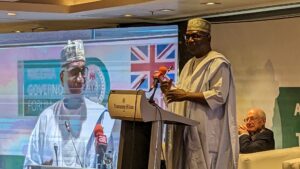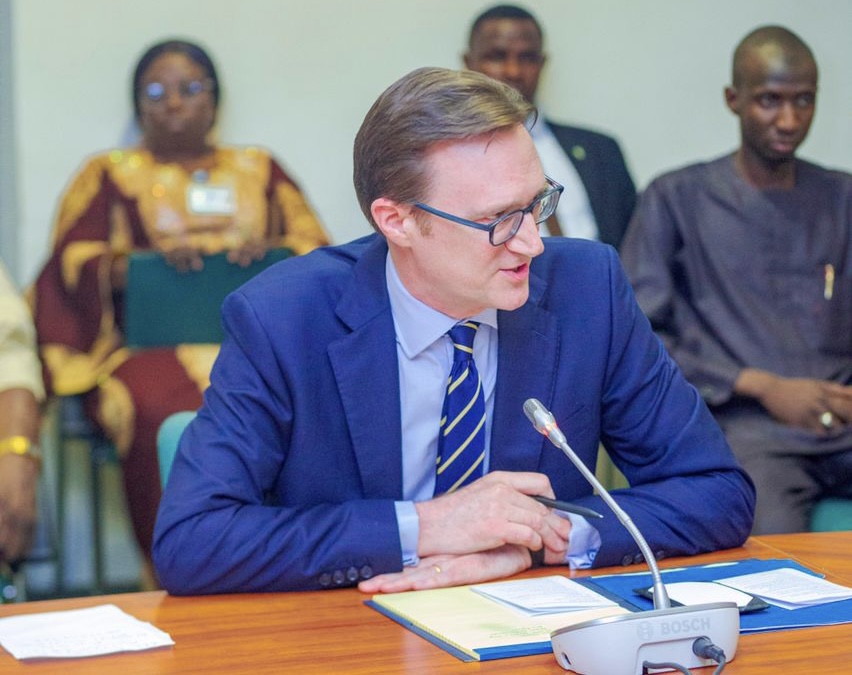Nigeria’s prosperity depends on getting her power sector right, the British High Commissioner to Nigeria, Mr Richard Montgomery, declared in Abuja on Wednesday.
Montgomery made the declaration at a roundtable on the Electricity Act 2023 with the theme: “Implications and Opportunities for State Electricity Markets’’.
The two-day event organised by the Nigeria Governors Forum (NGF) is funded by UK’s Foreign, Commonwealth and Development Office and implemented by the United Kingdom Nigeria Infrastructural Advisory Facility.
Montgomery was represented at the roundtable by the Deputy British High Commissioner to Nigeria, Ms Gill Atkinson.
He urged Nigeria to find ways to connect the dots between the power sector and inclusive growth.
“This is the time to explore new opportunities to scale up electricity delivery to more Nigerians.
“We need to give primacy to ways to promote expanded renewable integration, both on and off-grid.
“Nigeria gave fantastic commitments to COP26 and to the future of its power sector. This forum will help Nigeria to deliver those commitments,’’ she said.
COP 26 was the 26th UN climate change conference held in Glasgow from Oct. 31 to Nov. 13, 2021.
“We also need to find ways to connect the dots between the power sector and inclusive growth. Nigeria’s prosperity depends on getting the power sector right,’’ she said.
The envoy said deficit in the power sector was affecting about 90 million Nigerians and the country’s economy, and advised Nigerians to work with the new government to address the challenge.
“We have a new government here. It has embarked on important macroeconomic reforms. The exchange rate and the fuel subsidy are bringing short-term pain to the country and to the people of the country.
“These are positive changes in the medium to long term that will help Nigeria to fulfil its potential for the future.
“Part of this, and a particularly important moment, is the Nigeria’s power sector. Unfortunately, the country has the world’s largest absolute electricity deficit.
“This affects 90 million people. Even those Nigerians who are connected to the grid face frequent outages and do not get reliable supply,’’ Atkinson said.
She added that Nigeria must understand and acknowledge the impacts of the power supply problems both on the people of Nigeria and on its economy.
“What we are gathered here to do is to work on the credible reform process needed to resolve both the regulatory and the policy changes that are necessary.
“We need to work together to make sure these are addressed in an integrated manner.
“The Electricity Act, passed in June of this year, is an important component of the current reforms,’’ she said.

Earlier, Chairman of the NGF, Gov. AbdulRahman AbdulRazaq of Kwara, said the forum was promoting subnational electricity programme to facilitate the development of sustainable, competitive and diversified electricity markets.
AbdulRazaq said that the forum believed that the action would deepen the electricity market in Nigeria in a competitive way.
“We believe in partnership and getting divergent views on how to achieve the same goal. This is why this roundtable is so important and we look forward to reboot engagement in this important event.
“I hope we will leave here enriched to see how we can implement the Electricity Act and interface with existing structures,’’ AbdulRazaq said.
In his remarks, the NGF Director-General, Mr Asishana Okauru said growth in the electricity sector would inevitably catalyse economic development in Nigeria and impact positively on all other sectors.
Okauru said that the amended Electricity Act 2023 represented a significant milestone to achieving a stable, reliable, and efficient electricity supply for the people.
He noted that the Act also provided a legal framework for private sector participation in the generation, transmission and distribution of electricity.
Okauru described the roundtable as the first in a series of talks and activities that would jumpstart the development and growth of the electricity sector in the country.
“We are often told that the amendment of the Constitution and the signing of the Electricity Act 2023 open the sub national electricity market.
“To stakeholders and players in the industry, this makes perfect sense, but to laymen and perhaps to a majority of the populace, this is mere jargon.
“Our task, therefore, is to facilitate the simplification of this very complex and highly technical endeavour in a way that the government and the governed will fully appreciate.
“We have held and continue to hold talks with development partners and international donor organisations that have shown remarkable interest in supporting our efforts in ensuring the success of this initiative,’’ Okauru said.
He added that the NGF planned to unveil a support effort that would caption the Nigeria Sub-National Electricity Markets Support Programme.
“This is going to be a flagship project of the NGF and it will be designed to facilitate the development of sustainable, competitive and diversified sub-national electricity markets in the country,’’ Okauru said.

